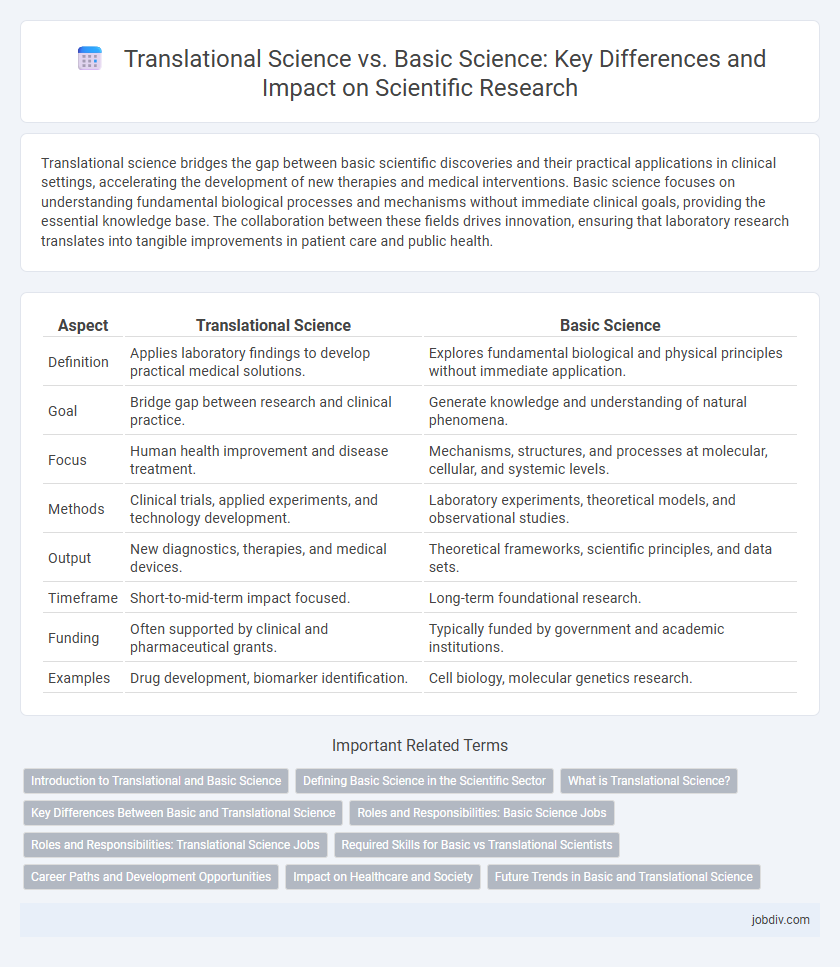Translational science bridges the gap between basic scientific discoveries and their practical applications in clinical settings, accelerating the development of new therapies and medical interventions. Basic science focuses on understanding fundamental biological processes and mechanisms without immediate clinical goals, providing the essential knowledge base. The collaboration between these fields drives innovation, ensuring that laboratory research translates into tangible improvements in patient care and public health.
Table of Comparison
| Aspect | Translational Science | Basic Science |
|---|---|---|
| Definition | Applies laboratory findings to develop practical medical solutions. | Explores fundamental biological and physical principles without immediate application. |
| Goal | Bridge gap between research and clinical practice. | Generate knowledge and understanding of natural phenomena. |
| Focus | Human health improvement and disease treatment. | Mechanisms, structures, and processes at molecular, cellular, and systemic levels. |
| Methods | Clinical trials, applied experiments, and technology development. | Laboratory experiments, theoretical models, and observational studies. |
| Output | New diagnostics, therapies, and medical devices. | Theoretical frameworks, scientific principles, and data sets. |
| Timeframe | Short-to-mid-term impact focused. | Long-term foundational research. |
| Funding | Often supported by clinical and pharmaceutical grants. | Typically funded by government and academic institutions. |
| Examples | Drug development, biomarker identification. | Cell biology, molecular genetics research. |
Introduction to Translational and Basic Science
Translational science bridges basic science discoveries and clinical applications by converting laboratory findings into effective treatments and health interventions. Basic science explores fundamental biological mechanisms and processes without immediate clinical goals, providing the essential knowledge that underpins translational research. The integration of both fields accelerates medical innovation, improving diagnostic tools, therapies, and patient outcomes.
Defining Basic Science in the Scientific Sector
Basic science, also known as fundamental or pure science, involves the systematic study of natural phenomena to generate foundational knowledge without immediate practical application. It focuses on understanding underlying principles and mechanisms across disciplines such as biology, chemistry, physics, and mathematics, providing the essential framework for all scientific advancement. This knowledge base enables translational science to develop practical solutions by applying these fundamental discoveries to medical, technological, and societal challenges.
What is Translational Science?
Translational science bridges the gap between basic scientific discoveries and their application in clinical settings to improve human health. It involves multidisciplinary research processes that convert laboratory findings into new diagnostics, treatments, and medical practices. This field accelerates the development of therapies by integrating biomedical research with patient-centered care and public health strategies.
Key Differences Between Basic and Translational Science
Basic science investigates fundamental biological mechanisms to generate new knowledge, focusing on understanding phenomena at the molecular, cellular, or organismal level. Translational science applies these discoveries to develop practical medical interventions, such as diagnostics, treatments, or prevention strategies, bridging the gap between laboratory research and patient care. Key differences include emphasis on hypothesis-driven exploration in basic science versus goal-oriented application in translational science, timelines for delivering impact, and collaboration between multidisciplinary teams to accelerate clinical outcomes.
Roles and Responsibilities: Basic Science Jobs
Basic science jobs primarily involve conducting fundamental research to understand natural phenomena, generating new knowledge without immediate practical applications. Researchers in these roles design experiments, analyze data, and publish findings to advance theoretical frameworks across disciplines such as biology, chemistry, and physics. Responsibilities include hypothesis formulation, laboratory work, and collaboration to explore mechanisms underlying health, disease, and environmental processes.
Roles and Responsibilities: Translational Science Jobs
Translational science professionals bridge the gap between basic research discoveries and clinical applications by designing and managing studies that convert laboratory findings into therapeutic interventions. Their responsibilities include coordinating multidisciplinary teams, overseeing regulatory compliance, and facilitating the development of protocols for clinical trials to accelerate the translation of scientific knowledge into patient care. Proficiency in project management, data analysis, and communication with stakeholders ensures effective collaboration between research and clinical domains in translational science roles.
Required Skills for Basic vs Translational Scientists
Basic scientists require strong analytical skills, proficiency in experimental design, and a deep understanding of molecular biology and genetics to investigate fundamental biological mechanisms. Translational scientists need expertise in clinical research, regulatory knowledge, and the ability to integrate multidisciplinary data to bridge laboratory discoveries with patient-centered applications. Both roles demand critical thinking and problem-solving but differ in their emphasis on theoretical exploration versus practical implementation.
Career Paths and Development Opportunities
Translational science bridges laboratory discoveries and clinical applications, offering career paths in interdisciplinary research, regulatory affairs, and clinical trial management that emphasize practical impact on patient care. Basic science focuses on understanding fundamental biological processes, providing development opportunities in academia, research institutions, and grant-funded projects aimed at expanding scientific knowledge. Professionals in translational science often engage with multidisciplinary teams and industry partnerships, while basic scientists primarily pursue specialized research and teaching roles.
Impact on Healthcare and Society
Translational science bridges the gap between basic scientific discoveries and practical medical applications, accelerating the development of new diagnostics, treatments, and preventive strategies that directly improve patient outcomes. Basic science generates foundational knowledge about biological mechanisms, which serves as the critical source of innovation for translational research to transform into effective healthcare solutions. The integration of both fields enhances public health by fostering evidence-based interventions and driving advancements in personalized medicine and disease management.
Future Trends in Basic and Translational Science
Future trends in basic and translational science emphasize integrating advanced technologies such as artificial intelligence, high-throughput sequencing, and CRISPR gene editing to accelerate discoveries and their clinical applications. Emphasis on multidisciplinary collaboration and data-driven approaches fosters personalized medicine and more efficient therapeutic development pipelines. Enhanced funding mechanisms and regulatory frameworks support seamless transition from bench research to bedside implementation, optimizing patient outcomes and scientific innovation.
Translational Science vs Basic Science Infographic

 jobdiv.com
jobdiv.com